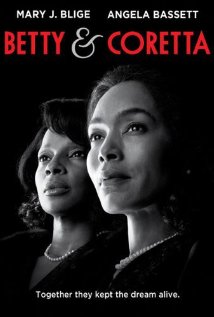
BETTY AND CORETTA
US, 2013, 95 minutes, Colour.
Angela Bassett, Mary J.Blige, Ruby Dee, Gloria Reuben, Malik Yoba, Lindsay Owen Pierre.
Directed by Yves Simoneau.
Betty and Coretta is a movie portrait of two significant widows, Coretta King, wife of Martin Luther King, and Betty Sharbazz, widow of Malcolm X. The film is a tribute to them, showing the strength of the two women, their meeting and friendship, collaboration, and as role models for women in the 20th century?
There are sketches of Malcolm X, his speeches, family life, the Nation of Islam, Elijah Muhammed, his principle of violence, By Any Means, the encounter with Coretta King and her apology, his impending sense of death and his assassination. There is a sketch of Martin Luther King, at home, speaking, in prison, and his assassination.
Mary J.Blige is Betty, a simple woman, a homemaker, with six daughters, devoted to her husband but wanting him to stay home and out of danger. She and her daughters were present when he was assassinated. The film shows her modesty at home, doing volunteer work, meeting Coretta King and speaking at a rally, going on to further studies, teaching, bringing up her daughters, the disappointment of her daughter who suffered from the assassination dropping out of studies, going to France, returning with a child, with a drug problem. The film shows her grandson and his setting fire to the apartment which led to her death.
Angela Bassett is strong as Coretta King, her support of her husband, continuing the march in Memphis just days after her husband’s assassination, speaking to rallies, taking a high-profile, continuing her husband’s work and offering leadership.
The film would have a strong impact in the United States, with women audiences everywhere – thought-provoking for audiences of both men and women.
1. The status of Malcolm X and Martin Luther King and their influence on 20th-century America, race issues, civil rights? Their memory? For the US? For African- Americans? for overseas audiences?
2. The focus on their wives, their lives after the assassinations, their coping in their family life, public life, their achievement?
3. The re-creation of the period, especially the 1960s, each decade following, the look, costumes and decor, the feel? Information about civil rights, the government, the presidents, the progress towards Martin Luther King Day as a public holiday?
4. New York City, Harlem, homes, theatres, assemblies? Washington DC, homes? Memphis? The musical score?
5. Ruby Dee as the narrator, on screen, telling the story, her vouching for the events as a witness, her praise of the two women?
6. The portrait of Malcolm X, the initial speech, Coretta King speaking to him afterwards, her apology, his home life, love for Betty, the children? New York, a sense of impending doom, death? Elijah Muhammed, Louis Farrakhan? The international visits? The preparation for a statement to the UN? His views, violence, the quotes, his changing towards the end of his life? The meeting at his death? Betty and the children present, the effect on them afterwards?
7. Martin Luther King, his speeches, relationship with Coretta, his family, his sense of mission, the achievements of 1963, the death of Malcolm X and his sympathy for Betty, the differences in violence and nonviolence? The scene in prison, Coretta’s visit, the effect on him? The assassination?
8. Coretta King and her, her relationship with her husband, the later issue of the tapes, his infidelities, her response, saying the tapes were private, not available? Saying that her husband was not a saint? Her strong support, continuing his work, insisting that the Memphis march go ahead four days after his death? The support of family and friends? Politicians? The negotiations over many years for the public holiday in honour of her husband?
9. Betty, in herself, the impact of her husband’s death, bringing up the children, finding a home? Her volunteer work? Her studying and degree, teaching, meeting Myrlie Evers? With the students, the projects? The visit of Coretta King? Her daughter, always traumatised by the death of her father? Going to Princeton, had not wanting to go, her leaving, travelling to friends, returning with the boy? Setting up house, the presence of Michael – the later revelation that he worked the FBI?
10. Radio program, the phone call to Coretta? The telling vision interview and her being asked directly about the blame for Louis Farrakhan? The scene with Farrakhan and his group looking at Betty?
11. The influence of J.Edgar Hoover, his hostility towards Martin Luther King, threatening to reveal the tapes as King went to receive the Nobel Prize? Bugging the house, the later production of the tapes? The hostility of the FBI, racism?
12. The rally, Coretta and Betty and their speeches, the impact on people? The bond between the two, their continued friendship, meetings, sharing, collaboration, Coretta speaking to the students? Her sadness with Betty’s injuries and death?
13. Betty, her age, grandmother, the son staying with her, her daughter’s problem with drugs? The clashes, the boy’s anger, setting the fire, the boy and the police? Betty in hospital, Coretta visiting, her death? The pathos of the situation and her death?
14. The portrait of significant women, significant women in the 20th century, role models and leadership?